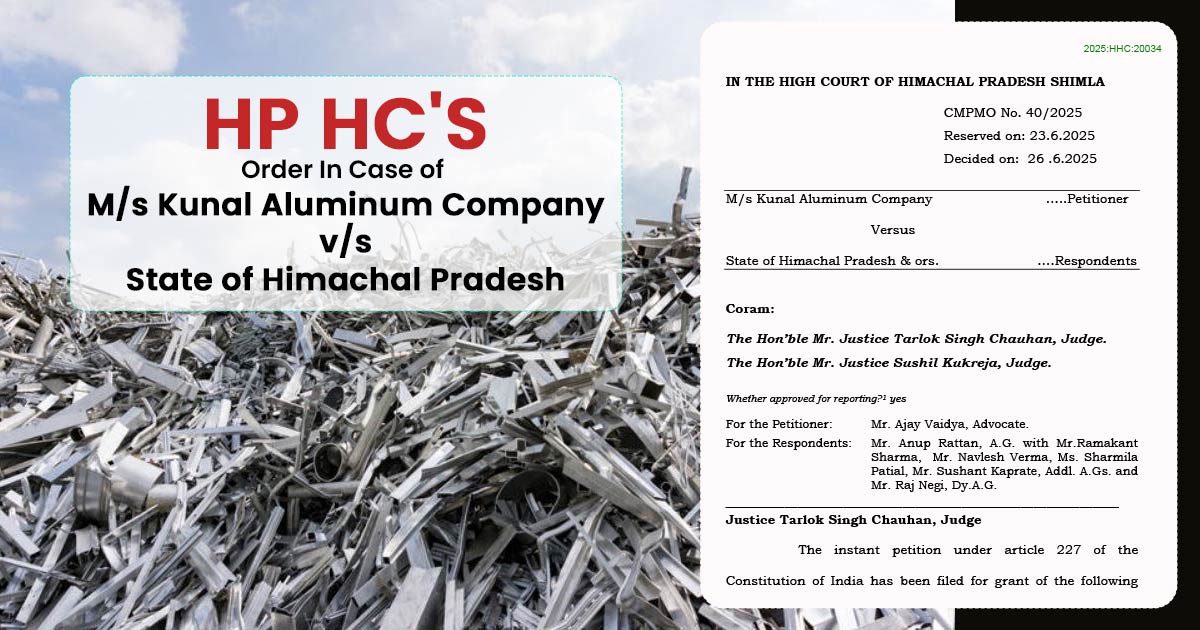
The Himachal Pradesh High Court cancelled the penalty and tax demand charged u/s 129 and 130 of the GST ( Goods and Services Tax ) Act for the non-generation of an e-way bill, ruling that the lack of intent to evade tax renders such a penalty unsustainable. It reaffirmed the condition of ‘Men Rea’.
For intentional acts of tax evasion, the penalties under the tax statute should be reserved instead for genuine, inadvertent lapses, the court said. As per the bench, the tax authorities are obligated to prove the intent to evade the tax of taxpayers before levying any penalty.
In the Solan district, Himachal Pradesh, the petitioner’s vehicle transporting aluminium scrap was intercepted and was discovered to be without a valid e-way bill. Even after the fact that applicable customs duty and IGST had been filed at the port of entry, the vehicle and goods were detained, and a tax and penalty of ₹7.12 lakhs (₹3.56 lakh each) was charged under Sections 129 and 130 of the CGST Act. Only after furnishing a bank guarantee of the said amount were the goods released.
The penalty was contested by the applicant, citing that the lapse was technical and no mala fide intention to evade tax was there. Supporting the same all the needed documents apart from the e-way bill were present, and the e-way bill was therefore generated. Even after the same, both the adjudicating and appellate authorities kept the penalty.
Post analysing multiple precedents along with Satyam Shivam Papers Pvt. Ltd. and Modern Traders, the HC ruled that for any tax penalty u/s 130 to be levied, the intent to evade tax is an essential condition.
As per the court, the laws of tax should distinguish between technical lapses and intentional evasion, and in the absence of mens rea, punitive actions become arbitrary and disproportionate.
The Bench Justice Tarlok Singh Chauhan and Justice Sushil Kukreja said that “To say the least, there has been no sound rationale to pass the order imposing penalty. After all, the essence of any penal imposition is intrinsically linked to the presence of mens rea, a facet conspicuously absent from the record of the instant case.”
The court cited that “The order, therefore, stands vulnerable to challenge on the grounds of disproportionate punitive measures meted out in the absence of concrete evidence substantiating an intent to evade tax liabilities. Clearly, the imposition of penalties without a clear indication of intent has resulted in an arbitrary exercise of authority, undermining the principles of justice. Tax evasion is a serious allegation that necessitates a robust evidentiary basis to withstand legal scrutiny. The mere rejection of post-detention e-way bills, without a cogent nexus to intention to evade tax, is fallacious”.
As per the court, only technical errors without any implications cannot have been the basis for levying the penalties. The philosophy is to keep a fair and just tax system where the penalties are as per the offence.
Read Also: Section 129 CGST Act Cannot Penalize Minor GST E-Way Bill Errors
The court, while criticising the mechanical approach of the revenue authorities, said that the order levying the penalty does not have any reason or proof to prove the tax evasion. As per that, the HC quashed the impugned order and asked the respondents to release the bank guarantee which the applicant has given along with the applicable interest within 4 weeks.
| Case Title | M/s Kunal Aluminum Company vs State of Himachal Pradesh |
| Order No. | CMPMO No. 40/2025 |
| For Petitioner | Mr. Ajay Vaidya |
| For Respondent | Mr. Anup Rattan, Mr.Ramakant Sharma, Mr. Navlesh Verma, Ms. Sharmila Patial, Mr. Sushant Kaprate, Mr. Raj Negi |
| Himachal Pradesh High Court | Read Order |